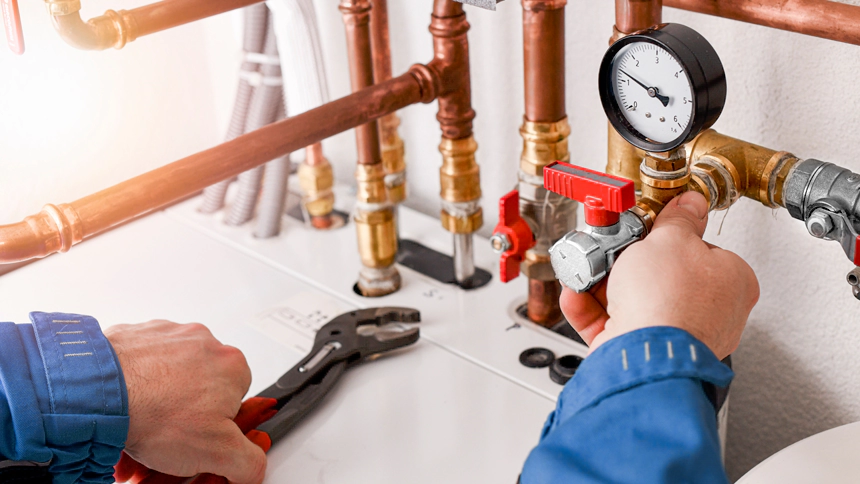Natural gas is key in our daily lives. From drying clothes to heating water to cooking, we need it for various everyday activities. However, keeping this essential utility in check is crucial to our safety. If not, it can leak and cause serious accidents. But how can you recognise a gas leak in your home or workplace? More importantly, how should you respond to a gas leak and ensure everyone’s safety?
Let’s explore it all in this blog post. First things first—
A. Signs of a Gas Leak:
Natural gas is odourless by nature. So, to keep us safe from its silent presence, gas companies infuse it with a distinctive sulphur-like scent. This pungent odour is your first and most important sign. Some more signs include –
Damaged Gas Pipes:
Cracks, corrosion, and physical damage in gas pipes can create hidden dangers. Regular inspections of your pipes and connections keep potential leaks at bay.
Unusual Noises:
Should you catch a hissing or whistling note near gas appliances, beware! This ominous sound may signal a sneaky gas leak. It arises as gas escapes, under pressure, through a tiny opening. Stay alert and ensure your safety!
White Cloud Near Gas Line:
If you notice a misty or dusty cloud hovering near a gas appliance or line, take heed. This phenomenon could well indicate a potential leak.
Bubbles in Water:
Notice any bubbles forming in puddles or stagnant water near your gas lines? This could signal an underground gas leak lurking beneath the surface. Stay vigilant!
Dead or Dying Plants:
Gas leaks can quietly rob the soil of its precious oxygen. This invisible thief can lead to sudden wilting or demise of houseplants and outdoor blooms alike.
Unexpected Increase in Gas Bill:
If your gas consumption stays steady while your bill soars, beware! This could signal a sneaky, invisible leak lurking behind the scenes.
Gas Meter Movement:
If your gas meter keeps spinning while all appliances are off, take heed. This could signal a leak in your system. It’s worth investigating, as even a minor issue can lead to major safety concerns. Stay safe and check your setup!
B. Required Actions:
Gas leaks can be sneaky, hiding in plain sight. Once the warning signs unveil themselves, swift action becomes crucial to outsmart danger. Follow these vital steps based on where you sniff out the leak.
If You Smell Gas Near an Appliance:
A faint gas odour lingering near your appliance can be a warning sign. It might mean the pilot light has been extinguished or that the burner valve is slightly open. To address this, first, ensure the pilot light is switched off and the burner valve is tightly closed. If the issue continues to raise alarm bells, it’s wise to call a professional gas plumber in Melbourne to examine the appliance thoroughly.
If You Smell Gas Inside Your Home:
A strong gas smell indoors suggests a more serious leak. In this case, follow these precautions:
- Turn off the main gas supply
- Do not ignite flames or use electrical devices during this time
- Open all windows and doors to provide ventilation
- Leave the premises and call a licensed gas plumber
If You Smell Gas Outside:
If you notice a gas smell outdoors, report it immediately! Contact your local fire department or gas company at once. Avoid the temptation to investigate the source yourself—it’s risky business. Instead, keep your distance from the suspected area and await trained professionals. Safety is paramount!
Can a Gas Leak Cause Health Problems?
Gas leaks are not just fire hazards; they’re serious health threats. When gas escapes from its pressurised confines, it steals oxygen from the air. This lack of oxygen can trigger asphyxiation, which is unfortunately life-threatening.
Common symptoms of gas exposure include:
- Difficulty breathing or suffocation
- Headache
- Dizziness or lightheadedness.
- Confusion or difficulty concentrating
- Loss of consciousness
- Nausea
- Chest pain
- Pale or discoloured skin
- Eye and throat irritation
- Nosebleeds
If you or anyone at home shows these symptoms, act swiftly. Seek medical attention right away and leave the affected area.
How Long Does It Take for a Gas Leak to Be Fixed?
The journey to fix a gas leak varies by severity and location. Minor leaks might meet their match within an hour’s time. However, extensive issues can stretch to 24 hours or more. If a gas service outage occurs, your utility provider will keep you informed. They’ll let you know when it’s safe to resume service. Always heed the professionals’ advice; prioritise safety before stepping back into the affected area.
Final Thoughts:
Gas leaks are no laughing matter; they demand your immediate attention. Tune in to the subtle signals of a gas leak: an odd smell, hissing whispers, or wilting plants. By spotting these signs early, you can prevent dangerous situations from escalating. Plus, regular check-ups by a qualified gas fitter can nip leaks in the bud.
Last but not least, for top-notch gas fitting services, from leak detection to expert repair, reach out to Your Local Plumbing. Our skilled team stands ready to keep your home safe and free from gas hazards.



